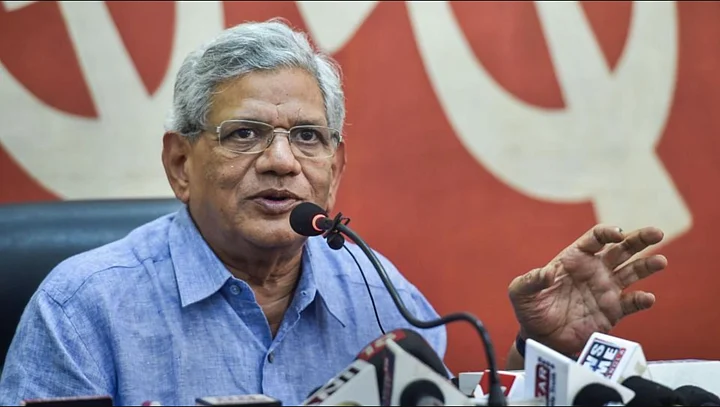Sitaram Yechury or “Sita” as his friends used to fondly call him was a paradox. He was a quintessential liberal and yet the leading light of a party dogmatic in its ideological faith. A pragmatist to the core grounded in hard grass-roots politics, he still remained a romantic about the ultimate triumph of world revolution.
He appeared laid back, ready to discuss the mistakes and flaws of his party and the current woes of the international Left, but without losing his fierce commitment to the cause working tirelessly to the end with as much zeal as he had when he first became a communist half a century ago.
It was this complex personality along with his personal charm that endeared him to me along with so many others over the decades. Conversations and debates with Sita were often volatile but always without rancour, his sharp polemics and wicked wit seeking to defeat but never personally belittle his opponent.
Not surprisingly he had so many friends across the political spectrum in Parliament and among the media who were ready to give the Marxist a patient hearing even when his party had badly slipped up.
In his student years, Sita who was the same age as me (both joining St Stephens College in 1970), and was surprisingly low-key considering his later career. Unlike some of us teenage radicals swept up by the Naxalite movement, he concentrated on his studies getting a first in Economics Honours. Always a brilliant student, getting the All India first rank in his Higher Secondary Examination, he could have gone on to become a top-notch global academic or a hot shot in the World Bank.
However, the fates had deemed otherwise.
His political career blossomed as soon as he joined Jawaharlal Nehru University (JNU) in 1974 where he found his calling in the guise of a student activist for the Students Federation of India (SFI) affiliated to the Marxist Communist party which he joined not long after.
Within a year he was in jail arrested along with other radical students by the Emergency regime during a police raid on JNU, targeted by the police during the 19-month dictatorial rule by the then Prime Minister Indira Gandhi and her son Sanjay as a hotbed of dissent.
For Sita, both the Emergency and his time in jail were pivotal moments that would prove decisive in determining the rest of his life. He emerged from jail a hero in JNU after the Congress government was ousted in 1977 and was very soon elected president of the SFI going on to become the architect along with senior student leader Prakash Karat of building the high-profile university as a unique leftist bastion in a region where communist parties had no hold whatsoever.
From university politics, the rise of the young Marxist leader in the communist hierarchy was quite meteoric.
By the mid-1980s he had been elected to the party central committee becoming the youngest ever politburo member in the early nineties and finally appointed to the prestigious post of general secretary of the party in 2015 which he held till his dying day elected thrice in succession.
Yet it was not Yechuri’s rapid rise in the party hierarchy that defined his political career. His ability to reach across the political spectrum had caught the eye of party stalwart Harkishan Singh Surjeet, a unique veteran Sikh party leader from Punjab who made ceaseless efforts to bring the Marxists from the margins to play a key role in mainstream politics.
Surjeet became Yechuri’s mentor and the two worked together to put together a broad democratic progressive front to meet the rising challenge of a militant communal right-wing spearheaded by the Bharatiya Janata Party and sponsored by the Rashtriya Swayamsevak Sangh (RSS).
As long as Surjeet with his phenomenal persuasive abilities to bring political foes together was politically active, Yechuri flourished including helping the Congress build a motley coalition of opposition parties to pull off a surprise victory in the 2004 Lok Sabha polls ousting the Atal Behari Vajpayee led National Democratic Alliance government.
But as the ageing Surjeet in his nineties grew more and more politically inactive, his protégé struggled to get his dogmatic colleagues to compromise with parties not belonging to the Marxist fold, most notably the Congress.
This resulted in a huge personal setback when the Marxists pulled out from the Congress-led UPA ruling coalition over its support for the nuclear deal with the United States, despite Yechuri passionately pleading not to do so.
The fact that the Congress-led coalition went on to survive without Marxist support and even won a second term, lent credence to Sita’s argument for compromise and not confrontation but also started the decline and marginalisation of the Marxists after a miraculous revival.
Although Yechuri personally stayed politically relevant in the aftermath of the fiasco over the nuclear deal, his party continued its downward slide, particularly in its former bastions of West Bengal and Tripura. With the demise of Sita, who was one of the key players who brought together the INDIA bloc, it will be both a blow for the Marxists as well as the entire Opposition to lose a political leader so eminently suited for all seasons.
(At The Quint, we question everything. Play an active role in shaping our journalism by becoming a member today.)
